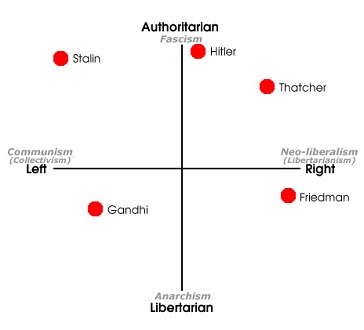
Within political ideology and thought there is a vast array of different positions and theories. Ranging from Fascism on the right to Communism on the left and ranging from Authoritarian to Libertarian. Just within the terms left and right there are variations. Even within an idea such as Democracy there are variations and different interpretations as to what it is, how it works, how it should work and what does need changing, if anything.
But one aspect of political thought that doesn’t get much mention is Extremism. It only gets mentioned when actions of those who are identified as extreme carry out some act of violence. But something being labelled as extreme doesn’t actually make it extreme. Is political extremism a clinical term that can be properly defined?
If a political ideology/belief is to be classified as extreme it needs to meet certain criteria; it must be absolute in its position and not open to any form change or negotiation, it invariably will have some form of violent aspect to its movement and identifies as not being within the ‘status quo’. Now the word ‘extreme’ itself is defined as “Reaching a high or highest degree”, “far from moderate”, “very serious or severe”.
So, while the actual word extreme has an absolute definition within the English language, its application of its meaning to political ideology is not so simple. With all the varying possible political positions, the ones currently identified as extreme have been labelled so. They were not naturally extreme form on the onset. Results of their actions, interpretations of their beliefs etc lead to them being labelled as extreme.

A quick example. The formation of the National Socialist German Worker’s Party (Nazis) in 1920s Germany were labelled as an extreme form of right wing politics and fell under the category of Fascist ideology, which in of itself is also extreme. This labelling of the party being extreme was a result of political commentators seeing what the group believed in and seeing that it was not in line with conventional and accepted conservative thinking. But as elements of Nazi thinking have within it a conservative mantra, it was taken to be an extreme form of right wing politics. The same can be broadly said for Communism but for left wing politics.
This means that the labelling of a movement as being ‘extreme’ is no more than a result of others merely applying that label to them based on their own understanding/interpretation of political ideology. In contemporary global politics, a liberal democratic model of government is taken to be the basic template for all nations. Anything not falling into this broad category is labelled as extreme, see North Korea. Does this mean that the world and subsequently the human race has created a template of an accepted form of government and society?
Looking at the models of government in the nations of the world and how nations interact with each other it’s easy to say yes, human society is now at a point where liberal democracy is accepted as the norm and anything not adhering to that system can safely be labelled as extreme. Causes for this could be debated for the rest of time. A personal theory of why this is, is because of previous imperial European empires and the spread of Western Capitalist economics.
The advent of the global communication, information and money age now means that ideas and money can spread around the globe in a matter of seconds and within modern politics, money and information go hand in hand. This means that the system of government from which the money and information originates can spread to other governments around the world thereby creating influence.
In writing this, I am looking at matters from my lovely left-wing glasses and the very political thoughts I would label as extreme invariably differ from many people who will read this. To me Fascism is an extreme ideology as a result of what it seeks to achieve and why.
However, if you take true Communism, I do not take that to be extreme as Communism at its core is merely Socialism but without aspects of a capitalist economy. The Communism seen from the Soviet Union is not true to proper Communist thinking. Karl Marx and Friedrich Engels would turn in their graves if they saw what happened throughout the Soviet Union in the name of Communism.
The application of the word extreme and labelling it to different political ideologies is not unique to occurring in politics. The same model of application can be used in religion and it broadly works in the same way, with some differences.
When applying the word extreme in relation to religion, things are a bit more complicated. Political discourse is made up of works from multiple different people over the course of hundreds of years and constantly evolves. For the most part, this is not true of religious thinking. A large amount of religious thinking derives from a holy book or ultimate source of information and that is the basis for that religion’s generic way of thought.
When applying the word extreme to religious thought, it is decided that an extreme belief within a religion is dependent on how literal the interpretation of the religious text is and whether they are prepared to accept others who disagree and if they will use violence as part of their religious undertakings.
But as is said in the title, one person’s extreme is another’s normal. If I were to have a conversation about religion with large numbers of people in America, some would consider me extreme for being an Atheist and for being a Socialist (some may even incorrectly label me as a ‘Commie’).
So as long as differing opinions and different interpretations exist, labelling something as extreme is merely a subjective application of one person’s or group of people’s thought as there will always be others to say what you say is extreme is in fact not extreme.
Ruby says
Interesting read.